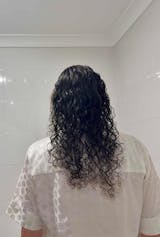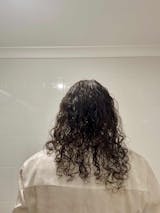
Navigating the Impact of Medication, rapid weight loss, and Surgery on Your Crowning Glory
Breaking down how medications, rapid weight loss, and post-surgery recovery can impact your hair

Your locks; The after-effects of medication, weight loss and other 'triggering events'
Acute telogen effluvium, or “TE” (a little easier to say and remember!), is a form of nonscarring alopecia (hair loss) that occurs for a period of less than 6 months1. This type of hair loss usually occurs 3-4 months after a triggering event2; think pregnancy, post-partum hormones, rapid weight loss, surgery, a stressful event or medications.
You may have experienced acute TE in the past and are curious to find out more, or perhaps you are experiencing a higher-than-usual rate of hair fall and think a triggering event, weight loss or medication may be the culprit. Read on as we delve the whys and wherefores of this frustrating topic.
Hair growth nuts and bolts
The hair on your head grows and sheds in a somewhat random fashion.
At any point in time a random amount of your hairs may be in one of three phases: Anagen (active growth phase lasting 2 – 6 years accounting for about 80-90% of hair follicles); Catagen (transitional phase lasting 2 – 3 weeks); or Telogen (10-20% of scalp hair follicles are in this resting stage which lasts about 100 days) 4. Everyone sheds hair and you may see more hair shed at certain times of the year.

Thinning hair…do care!
TE begins when a triggering event or life stage causes many hairs in the growing phase of the hair cycle (anagen) to abruptly enter the resting phase (telogen)3. A diagnosis of TE may be given by a practitioner when more than 25% of hair follicles are in the telogen phase2.
Following a triggering event, hair enters the telogen phase where growth stops for 1 to 6 months (on average 3 months) although most people don’t notice that hair growth has stopped. When the hairs re-enter the growth phase (anagen), the hairs which had been suspended in the resting phase (telogen) are extruded from the follicle, and hair shedding, at a greater rate becomes noticable3.
People with telogen effluvium usually shed between 30% to 70% more than the normal 100-150 hairs a day5.

Delving into a ‘triggering event’
Triggering events can vary in their nature and severity. Some proposed triggers that lead to acute TE include rapid weight loss, pregnancy, post-partum hormones, acute stress or trauma (physical or emotional), as well as surgery.
Triggering events that may be linked to TE hair loss usually occur several months prior to the hair shedding and thinning. An individual may have completely recovered from the event, stopped taking the associated medication or even put a stressful period out of their mind. When hair suddenly starts to fall or shed in a rapid nature several months later, this important connection may be missed.
Frequently, in about 33% of cases, the cause or triggering event remains unknown2.
Is my medication to blame?
Many medications have also been linked to drug-induced telogen effluvium, but the most common are beta-blockers, GLP-1 weight loss medications such as Ozempic, retinoids, anticoagulants, propylthiouracil, carbamazepine, and some immunisations3. Your doctor may not mention hair loss as a side effect of some medications, so you may look to do your own research and read the drug manufacturer's complete warnings. If you’re experiencing significant hair loss and suspect a medication may be to blame, speak to your healthcare professional to discuss alternatives or options.
Rapid weight loss medications, including GLP-1 receptor agonists such as semaglutide and tirzepatide, have gained widespread popularity for the management of type-2 diabetes and obesity. Emerging reports associate these medications, or the rapid weight loss they induce, with hair shedding patterns such as alopecia and TE. While the exact mechanism remains unclear, current theories suggest that rapid weight loss can contribute to malnutrition and essential nutrient deficiencies. This nutritional disruption may impair the hair growth cycle and trigger the onset of alopecia.6
You’re not alone
The exact prevalence of telogen effluvium is not known, but it is considered to be quite common. A large percentage of adults experience an episode of telogen effluvium at some point3.
OK, now what?
If you're shedding more hair than usual, the reassurance that you are not alone can feel hollow. Acute TE is a self limiting condition, meaning it follows a defined course and typically resolves within six months1. Once the trigger is identified and addressed, the shedding settles, although recovery requires patience after a significant episode.
Rapid weight loss, including weight loss associated with GLP 1 receptor agonists, can act as a physiological stressor. A sudden reduction in caloric intake, protein, or key micronutrients can shift a higher proportion of follicles into the telogen phase, leading to increased shedding several months later. Understanding this timeline, along with the normal hair growth cycle, helps set realistic expectations for recovery and reduces unnecessary anxiety.

When short term telogen effluvium can be linked to a clear trigger such as surgery, illness, or medication that has been discontinued, the most appropriate course is often watchful waiting while follicles reset.⁴ Washing, brushing, and styling do not worsen the condition. The hairs that shed have already transitioned out of the growth phase.³
Targeted nutritional support can assist recovery by correcting deficiencies and supporting follicle function. Ensuring adequate intake of protein, iron, zinc, essential fatty acids, and key vitamins helps create the conditions required for healthy regrowth.
How Apotecari can help
While you are on any medications or specialist instructions, its important you discuss the introduction of any supplements, such as Crowning Glory or Mane Event, with your healthcare professional. Your doctor or medication prescriber is best-placed to understand your specific medical history and current medication routine. Once you have the OK to proceed with nutritional supplements or you finish your course of medication, Mane Event and Crowning Glory can offer intensive and targeted support. To encourage new growth, 3 months of Mane Event is ideal to kick start your hair recovery journey. If a dry, flakey or irritated scalp has resulted from use of certain medications, Crowning Glory can provide nourishment and hydration from within, helping to restore the skin's barrier function.

Hair Atelier is an excellent addition to a healthy diet and can be incorporated into your routine in a versatile and simple manner, daily. If you are on medications or have recently undergone surgery, are pregnant or breastfeeding, Hair Atelier offers suitable nutritional support that can assist your hair and follicles from within.

References
1 Malkud S, Telogen Effluvium: A review. Journal of Clinical and Diagnostic Research. 2015 https://www.ncbi.nlm.nih.gov/pmc/articles/PMC4606321/
2 Asghar F et al, Telogen Effluvium: A review of the literature. Cureus. 2020 https://www.ncbi.nlm.nih.gov/pmc/articles/PMC7320655/
3 Hughes EC et al Telogen Effluvium. StatPearls. 2020 https://www.ncbi.nlm.nih.gov/books/NBK430848/
4 American hair loss association https://www.americanhairloss.org/hair_science/index.html
5 Medications that Can Cause Hair Loss, WebMD https://www.webmd.com/skin-problems-and-treatments/hair-loss/drug-induced-hair-loss-2#1
6 Hair Loss Associated With Glucagon-Like Peptide-1 (GLP-1) Receptor Agonist Use: A Systematic Review. Cureus. 2025 Sep 16;17(9):e92454 https://pmc.ncbi.nlm.nih.gov/articles/PMC12530271/





